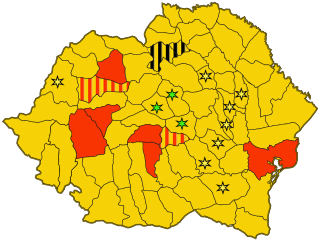Parliamentary elections were held in Greece on 25 September 1932. All 250 seats in the Lower House of the Greek Parliament, the Chamber of Deputies, were elected, as well as one-third of the seats in the Senate. The outcome was an ambivalent result for the two biggest parties, the Liberal Party of Eleftherios Venizelos and the People's Party. The People's Party received a plurality of votes in the Chamber of Deputies elections, but won fewer seats than the Liberal Party. The Liberals also won the most seats in the Senate.

General elections were held in Romania in December 1937. The Chamber of Deputies was elected on 20 December, whilst the Senate was elected in three stages on 22, 28 and 30 December. Voting was by universal male suffrage, making them the last elections held before women could vote.

The Magyar Party was a political party in post-World War I Romania.

Parliamentary elections were held in Czechoslovakia on 27 October 1929. The Republican Party of Farmers and Peasants, emerged as the largest party, winning 46 seats in the Chamber of Deputies and 24 seats in the Senate. Voter turnout was 90.2% in the Chamber election and 78.8% for the Senate. The rightward shift of the 1925 elections was reversed, with moderate centre-left groups increasing their vote shares whilst the Communist Party suffered a set-back.

Parliamentary elections were held in Czechoslovakia on 15 November 1925. The result was a victory for the Republican Party of Farmers and Peasants, which won 45 seats in the Chamber of Deputies and 23 seats in the Senate. Voter turnout was 90.1% in the Chamber election and 77.3% for the Senate.

Senate elections for a third of chamber were held in the Czech Republic on 13 and 14 November 1998 with a second round on 20 and 21 November.
General elections were held in Romania between 1 and 3 March 1922. In the first stage between 1 and 3 March, seats in the Senate were elected. In the second stage between 5 and 7 March the Chamber of Deputies was elected, and in the third and final stage from 9 to 11 March, additional Senate seats were elected. The result was a victory for the governing National Liberal Party, which won 222 of the 372 seats in the Chamber of Deputies and 111 of the 148 seats in the Senate. Both houses were combined to form a Constitutional Assembly, which approved the 1923 constitution.

General elections were held in Romania in May and June 1926. The Chamber of Deputies was elected on 25 May, whilst the Senate was elected in two stages in May and 10 June. The result was a victory for the governing People's Party, which, together with the allied Romanian National Party, Magyar Party and German Party, won 292 of the 387 seats in the Chamber of Deputies and 107 of the 115 seats in the Senate elected through universal male vote. With some exceptions, the Peasants' Party and the main branch of the National Party ran on common lists under the name of National Peasant Bloc.

General elections were held in Romania in July 1927. The Chamber of Deputies was elected on 7 July, whilst the Senate was elected in three stages on 10, 12 and 14 July. The result was a victory for the governing National Liberal Party (PNL), which won 318 of the 387 seats in the Chamber of Deputies and 92 of the 110 seats in the Senate elected through universal male vote.
General elections were held in Romania in December 1928. Immediately after acceding to power, the National Peasants' Party (NPP) prepared the next elections. The lists were filed before the local Courts before 26 November, while voting took place for the Chamber on 12 December, the Universal College of the Senate on 15 December, the local/county councils (Senate) on 17 December, and the Chamber of Industries and Commerce (Senate) on 19 December.
General elections were held in Romania in June 1931. The Chamber of Deputies was elected on 1 June, whilst the Senate was elected in three stages on 4, 6 and 8 June. The result was a victory for the governing National Union, an alliance of the National Party, the National Liberal Party, the German Party, the Agrarian Union Party, the Vlad Ţepeş League, the Agrarian League and several other parties. The Union won 289 of the 387 seats in the Chamber of Deputies and 108 of the 113 seats in the Senate elected through universal vote. The five seats won by the Communist-dominated Peasant Workers' Bloc were ultimately invalidated by the new Parliament.
General elections were held in Romania in December 1933, the third in three years. The Chamber of Deputies was elected on 20 December, whilst the Senate was elected in three stages on 22, 28 and 29 December.
The Liberal-Social Union was a political alliance in Czechoslovakia and the Czech Republic, existing from 1991 to 1994, and led by František Trnka.

The Czechoslovak Traders' Party was a liberal and conservative political party in Czechoslovakia, whose notable leaders were Josef Václav Najman and Rudolf Mlčoch.
The Agrarian Union Party was a political party in Romania.
The Radical Peasants' Party was a political party in Romania.
The Agrarian League was a political party in Romania.
The Ecological Movement of Romania was a political party in Romania.
The Alliance for Romanian Unity was a political alliance in Romania. It had ties to the Romanian Hearth Union.

The Democratic Agrarian Party of Romania was a political party in Romania.










